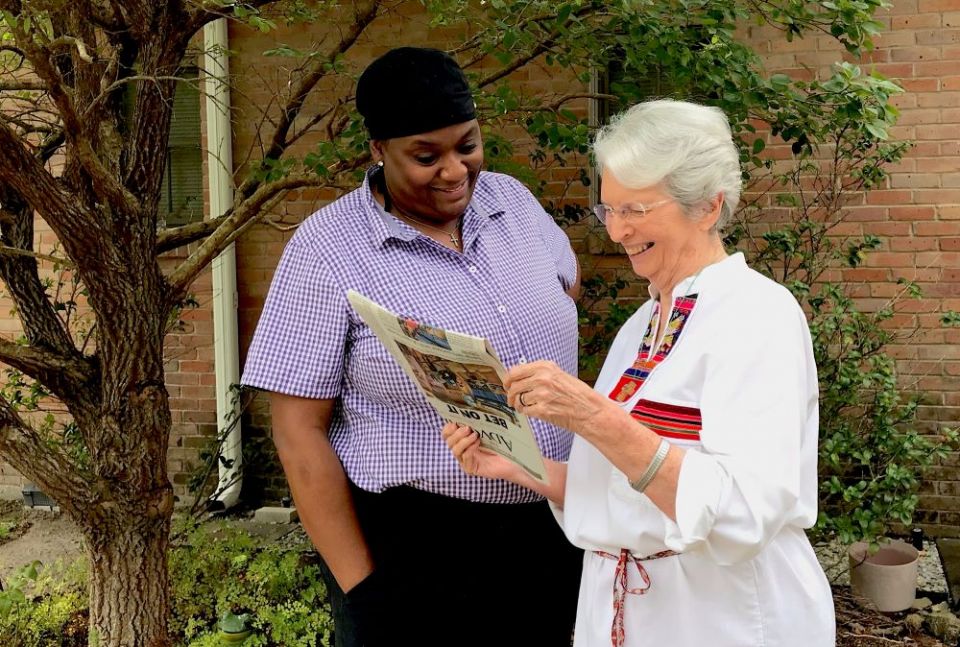11.23.21 GSR Dianne Fanguy.jpeg

After 31 years overseas, Sr. Dianne Fanguy expected to return to the United States for her retirement and a quiet life of prayer, maybe even some volunteer work.
Instead, at age 82, the St. Joseph sister has spent the last three years helping fight a proposed $9.4 billion plastics manufacturing complex in rural St. James Parish, Louisiana. The complex would comprise 14 plastics plants on a bend in the Mississippi River between New Orleans and Baton Rouge.
Fanguy taught high school in the United States for 16 years, then spent a year working in Guatemala. She came back to the United States to spend five years leading formation of sisters in her congregation, then spent eight years working with the Maryknoll Sisters in Bolivia. She topped this off by serving for 22 years at an education center in Nicaragua.
Now, instead of resting, she’s fighting a huge corporation. She’s also sometimes trying to remember English.
"I'm still trying to readjust," Fanguy says. "I was down there too long."
Formosa Plastics Group will have to adjust, too. Its project is on hold for at least two years while the U.S. Army Corps of Engineers conducts an environmental impact review of the project. The Corps had approved construction permits for the project, but project opponents filed a lawsuit. The Corps admitted errors and rescinded the permits.
Advertisement
Advertisement
Critics say the massive project would emit greenhouse gases equivalent to the output of three and a half coal-fired power plants. It also would introduce more cancer-causing chemicals to an area already known as "Cancer Alley," a corridor of 140 oil refineries and petrochemical plants lining the river between Baton Rouge and New Orleans.
Fanguy said she had no desire to get involved and didn’t know what she could do if she did.
"I said, 'God, you know I can't do anything else, you know what my health is, I can’t take something like this on,' " Fanguy said.
But she also felt she didn’t have a choice.
GSR: You started religious life as a high school teacher. Now you're becoming an expert on plastics manufacturing and chemical emissions. How does that happen?
Fanguy: At our last Chapter [meeting] in 2018, we talked about how we're killing the Earth, so the environment came up as a priority. And the biggest and most destructive polluter right now is plastic — it just doesn't go away, ever. So the congregation said, "let's do a study of plastics" and formed a committee.
We did three studies of the issue, then had a reflection session. We're having this discussion, and my insides are just roiling, absolutely a volcano waiting to erupt. I said, "I think it's good that we're saving plastic bags, but this [project] going on right here, 42 miles from where we are in Baton Rouge. I have no idea what to do, but I feel like we have to do something. Is anyone else interested?" Four other sisters raised their hands.
We started meeting almost every Friday from then on. We went to good old Google and we started to educate ourselves — and we began to get some idea of the enormity of this monster. We were blown away, just blown away.
But then you found out you weren't alone in this fight
There was this little-bitty group called Rise St. James from a Black community right down the river in St. James [where the project is located]. It was a tiny group, but they had had enough people in their families that died of cancer they knew they had to do something. And we found the Louisiana Bucket Brigade. We hooked up with those groups and through them met a lot of other groups.
When we gave an update for the congregation, I asked how many had family members that worked in the [petrochemical] plants, and about half raised their hands. Then I said how many of them died of cancer? Not one hand went down.
My daddy died in his 60s of cancer. He didn't smoke, there was no cancer in the family, there was no reason for it.
But that’s the issue, isn't it? These plants mean lots of good paying jobs in a place desperately in need of them. Louisiana has offered $1.5 billion in incentives and Formosa has promised 1,200 permanent jobs, plus thousands more during construction.
Everybody wants to come to Louisiana [to build factories] because we're poor and willing to give big tax breaks to anyone who brings jobs. We have refineries, we have water via the Mississippi and we have poor people. And they promise jobs.
But the amount of environmental harm that’s going to be done if this happens is unbelievable.
Like what you're reading? Sign up for GSR e-newsletters!


